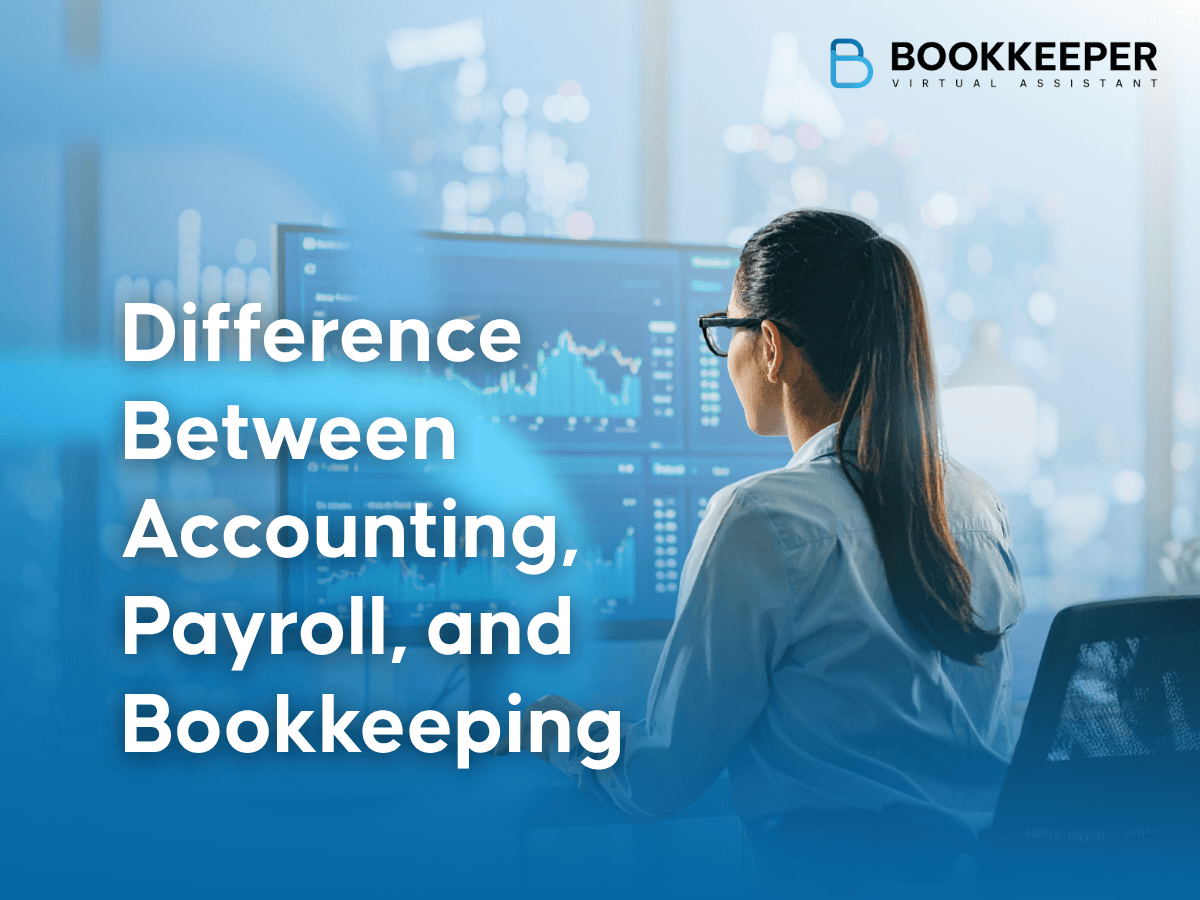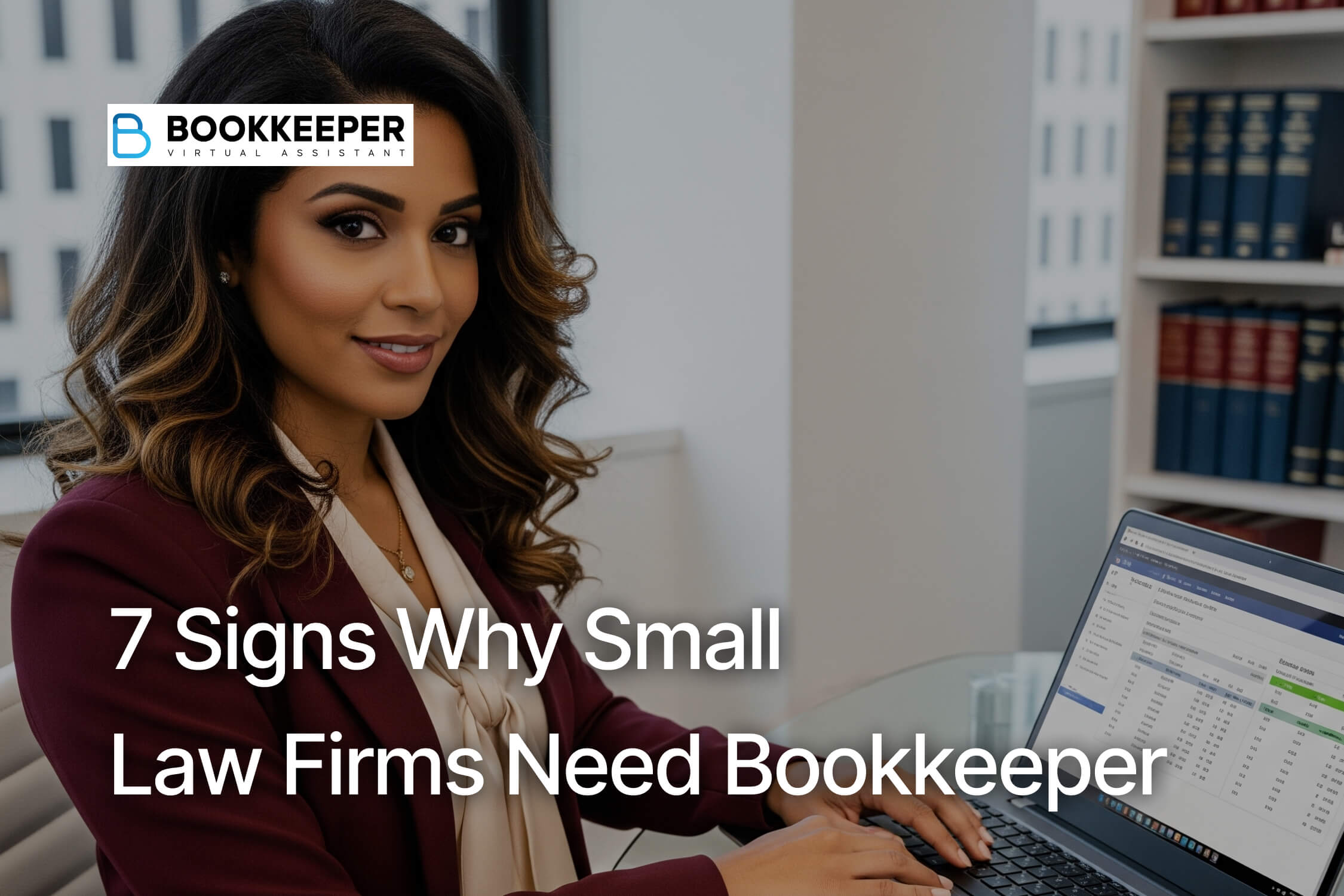Managing a business’s finances is essential for smooth operations. But, it can be complex, and the terminology used to describe various financial functions often causes confusion. In this blog, we’ll explore the differences between accounting, payroll, and bookkeeping.
By understanding these terms, you’ll gain insight into the role and purpose of each function in a business—helping you know when to use each one and how they work together to run your business more effectively.
What is Bookkeeping?

Bookkeeping is the process of recording and organizing all financial transactions of an individual or a business. It involves tracking, storing, and retrieving daily financial activities, including sales, purchases, receipts, and payments.
A bookkeeper is responsible for recording daily financial transactions. Their main role is to maintain financial records that are accurate, up-to-date, and compliant with accounting standards and regulations. Without proper bookkeeping, it becomes difficult to understand your business’s financial position or make informed decisions based on reliable data.
What is Payroll?

Payroll is the process of paying employees for their work. It can also refer to the list of a company’s paid employees or the total amount a company pays them.
A payroll record includes details such as salaries, wages, withholding taxes, benefits, and deductions. Payroll ensures timely payments to both employees and government agencies.
Payroll tasks are typically handled by a bookkeeper, accountant, or payroll specialist. Professionals managing payroll must maintain detailed records of employee hours, vacation time, sick leave, and other compensation-related information.

Common payroll processing tasks include:
- Managing tax filings
- Calculating and organizing taxes and deductions
- Preparing year-end documents like W-2 or 1099
- Handling wage garnishments
- Ensuring compliance with labor laws
- Compensating employees accurately
- Issuing payslips with detailed breakdowns
What is Accounting?

Accounting is the process of recording and categorizing financial transactions, which are then summarized, analyzed, and reported as financial insights. This financial information can take various forms, such as balance sheets, income statements, statements of retained earnings, and cash flow statements. These standardized reports are essential for making informed decisions and assessing a business's performance.
While accounting encompasses many types, the two most common categories are financial and managerial accounting. Each of these plays an important role, but overall, accounting supports businesses to make informed decisions regarding investments, expansion, and operational improvements.
Understanding the Differences:
Now that we have explored the definitions and basics of accounting, payroll, and bookkeeping, let’s clarify the main differences between these functions.
Bookkeeping vs. Payroll
Bookkeeping records all financial transactions, including payroll expenses, but it doesn’t handle the actual process of paying employees. Payroll, on the other hand, focuses specifically on employee compensation and related tax obligations.
For example, your bookkeeper records payroll expenses in your ledger, but a separate professional is responsible for issuing paychecks and withholding taxes.
Payroll vs. Accounting
Payroll is a component of accounting, but it’s just one of the subset of it. Accounting has a broader scope that includes analyzing, verifying, and reporting of financial data, such as payroll, to evaluate past performance and future projections.
While payroll ensures your staff is getting paid, accounting uses that payroll data, along with other financial information, to provide deeper business insights.
Accounting vs. Bookkeeping
Bookkeeping is a transactional process that records what happened financially. Accounting is an analytical process that interprets what those transactions mean for your business.
Bookkeeping creates the organized foundation of financial data that accountants use to generate reports and offer recommendations. Accounting can’t function effectively without accurate bookkeeping, but bookkeeping alone won’t give you the insights needed for business growth.
What Situation Would I Need Payroll, Bookkeeping, or Accounting?
Each function serves a specific purpose, and knowing when to use them can save you time and resources. Here are some scenarios to guide you:
You Need Bookkeeping When:
- Starting a business
- Setting up financial record-keeping systems
- Preparing for tax season
- Applying for loans and needing clean financial documentation
- Tracking income and expenses to manage cash flow
- Scaling operations and needing structured financial processes
You Need Payroll Services When:
- Hiring your first employee
- Complying with tax withholding requirements
- Expanding to multiple states with complex tax regulations
- Dealing with contractor vs. employee classification
- Managing benefits and payroll processing
- Facing penalties for late tax filings
You Need Accounting When:
- Making business decisions that require financial analysis
- Preparing financial statements for investors or lenders
- Planning and projecting cash flow for growth
- Handling complex tax situations
- Assessing business performance
- Identifying opportunities for improvement

Final Note
Accounting, bookkeeping, and payroll form the foundation of financial management, each supporting different stages of the financial process. Bookkeeping keeps your financial records organized by tracking daily transactions. Payroll ensures employees are paid accurately and in compliance with regulations. Accounting delivers the insights you need to make informed decisions.
When you want control and visibility of your financial operations, it’s important to understand the role each function plays. The key is knowing when each service becomes necessary. Consider factors like your business size, operational complexity, and goals to determine which functions to prioritize.
Most successful businesses use all three functions, either through in-house staff or external service providers. But, every business is different. You can start small with bookkeeping, add payroll as you begin hiring, and incorporate accounting services as you plan for growth.
Frequently Asked Questions
Are bookkeeping and accounting the same thing?
No. Bookkeeping records daily financial transactions, while accounting analyzes and interprets that data to support business decisions.
Is payroll part of accounting?
Yes. Payroll is a component of accounting that deals with employee compensation and tax withholdings. The payroll data is then analyzed and reported within the broader accounting system.
Does a bookkeeper do payroll?
Some bookkeepers offer payroll services, but payroll is a task that requires specialized knowledge. Many professionals use payroll software to help manage and simplify the process.





